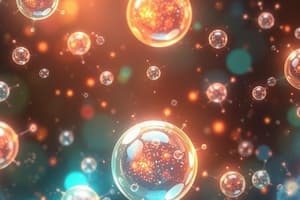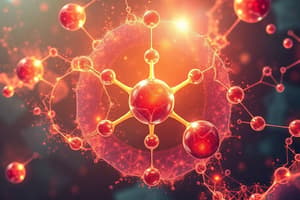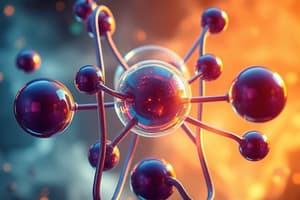Podcast
Questions and Answers
What is chemistry?
What is chemistry?
The science that seeks to understand the properties and behavior of matter by studying atoms and molecules.
Atoms are the building-blocks of matter.
Atoms are the building-blocks of matter.
True (A)
Which of the following best describes a molecule?
Which of the following best describes a molecule?
- A single atom
- An element represented in the periodic table
- Two or more atoms bonded together (correct)
- A type of solid matter
Matter can be classified according to state and _____ .
Matter can be classified according to state and _____ .
What are the three main states of matter?
What are the three main states of matter?
Solid matter has a fixed volume and a fixed shape.
Solid matter has a fixed volume and a fixed shape.
Which of the following is an example of a crystalline solid?
Which of the following is an example of a crystalline solid?
Which property best describes liquid matter?
Which property best describes liquid matter?
Study Notes
The Chemical World
- Chemistry is the study of matter and its properties, particularly at the atomic and molecular level.
- Chemistry is crucial for understanding many other scientific fields.
- Everything around us is composed of chemicals.
Atoms and Molecules
- Matter is made of atoms, which are the building blocks of matter.
- Each element is composed of a unique type of atom. There are 120 known elements, which are organized in the periodic table.
- Compounds are formed when two or more different types of atoms bond together to create molecules.
- Molecules are the building blocks of compounds.
- The properties of a substance are determined by the properties of its component atoms and molecules.
- Some elements exist as molecules, not individual atoms. These are called molecular elements, such as H2, N2, O2, F2, Cl2, Br2, I2, P4, S8, Se8 and O3.
The Classifications of Matter
- Matter is anything that occupies space and has mass.
- Matter is classified based on its state (physical form) and its composition (its components).
The States of Matter
- Matter can exist in three main states: solid, liquid, or gas.
- The state of matter can change from solid to liquid to gas by increasing temperature.
Solid Matter
- Solids are composed of tightly packed particles (atoms or molecules).
- Due to the tightly packed nature, solids retain their shape and volume.
- While atoms and molecules in solids vibrate, they do not move freely or past each other.
- Examples of solids include ice, aluminum, iron, wood, salt, and diamond.
Crystalline or Amorphous Solids
- Crystalline solids are characterized by a repeating, ordered arrangement of atoms or molecules in patterns.
- Examples of crystalline solids include table salt (NaCl) and diamond.
- Amorphous solids have a disordered arrangement of atoms or molecules, lacking a long-range pattern.
- Examples of amorphous solids include graphite, rubber, glass, and plastic.
Liquid Matter
- Liquids are made of particles packed less tightly compared to solids.
- Particles in a liquid can move around but maintain a relatively close proximity, ensuring a fixed volume.
- Liquids take the shape of their container due to their ability to flow.
- Liquids have a fixed volume but not a fixed shape.
- Examples of liquids include water, oil, and gasoline.
Studying That Suits You
Use AI to generate personalized quizzes and flashcards to suit your learning preferences.
Related Documents
Description
Explore the fascinating world of chemistry with this quiz on atoms, molecules, and the classification of matter. Understand the fundamentals of chemical properties and how elements combine to form compounds. Test your knowledge of the periodic table and different types of matter!




